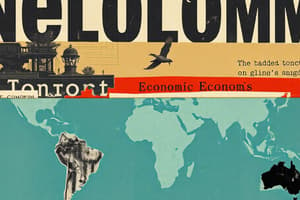Podcast
Questions and Answers
What is the primary goal of neoliberalism in terms of government intervention?
What is the primary goal of neoliberalism in terms of government intervention?
- To restrict government intervention to only necessary circumstances. (correct)
- To enhance government control over free market operations.
- To increase government spending for social programs.
- To completely eliminate government intervention in the economy.
Which of the following best describes the economic role assigned to the state under neoliberalism?
Which of the following best describes the economic role assigned to the state under neoliberalism?
- Intervening in the market to regulate competition.
- Setting prices for essential goods.
- Providing extensive welfare programs.
- Defining property rights and enforcing contracts. (correct)
How does neoliberalism fundamentally view market failures?
How does neoliberalism fundamentally view market failures?
- As reasons to increase regulation in the economy.
- As issues that typically resolve themselves over time. (correct)
- As problems that require government solutions.
- As necessary for economic progress.
What economic philosophy is most directly opposed to neoliberalism?
What economic philosophy is most directly opposed to neoliberalism?
The North American Free Trade Agreement (NAFTA) serves as an example of what neoliberal principle?
The North American Free Trade Agreement (NAFTA) serves as an example of what neoliberal principle?
What is a core belief of the laissez-faire philosophy that aligns with neoliberalism?
What is a core belief of the laissez-faire philosophy that aligns with neoliberalism?
In which decade did neoliberalism primarily emerge as a response to Keynesian economics?
In which decade did neoliberalism primarily emerge as a response to Keynesian economics?
Which of the following is NOT associated with the principles of neoliberalism?
Which of the following is NOT associated with the principles of neoliberalism?
What fundamental belief underpins laissez-faire economics regarding government intervention?
What fundamental belief underpins laissez-faire economics regarding government intervention?
How do critics of neoliberalism view the application of free market principles in public services?
How do critics of neoliberalism view the application of free market principles in public services?
What negative impact can result from neoliberal policies in relation to income distribution?
What negative impact can result from neoliberal policies in relation to income distribution?
What does neoliberalism emphasize in terms of economic policy?
What does neoliberalism emphasize in terms of economic policy?
How does globalization, as influenced by neoliberalism, affect local cultures according to critics?
How does globalization, as influenced by neoliberalism, affect local cultures according to critics?
What potential positive outcome of globalization is highlighted by proponents of neoliberalism?
What potential positive outcome of globalization is highlighted by proponents of neoliberalism?
In the context of neoliberalism, how is the relationship between wealth accumulation and spending power often characterized?
In the context of neoliberalism, how is the relationship between wealth accumulation and spending power often characterized?
What is the stance of neoliberal economists on the role of government in relation to globalization?
What is the stance of neoliberal economists on the role of government in relation to globalization?
What is a common criticism regarding the effect of neoliberalism on monopolies?
What is a common criticism regarding the effect of neoliberalism on monopolies?
In liberalism, what is prioritized above all in societal structure?
In liberalism, what is prioritized above all in societal structure?
Flashcards are hidden until you start studying
Study Notes
What is Neoliberalism?
- It's an economic philosophy that emphasizes free trade, deregulation, globalization, and limited government intervention.
- Advocates for a free market economy with minimal government regulation, lower taxes, and reduced government spending.
- Focuses on economic growth, efficiency, and individual choice within a capitalist system.
- Believes government intervention should be limited to defining property rights, enforcing contracts, and regulating the money supply.
History of Neoliberalism
- Developed as a response to Keynesian economics in the 1980s.
- Keynesian economics emphasizes government intervention to address market inefficiencies and ensure equitable distribution of wealth.
- Neoliberalism arose as a criticism of Keynesian principles during a period of economic stagnation and inflation.
Key Concepts of Neoliberalism
- Laissez-faire: A French term meaning "leave alone", advocating for minimal government intervention in the economy.
- Free Market Capitalism: An economic system where the government has limited influence and market forces determine prices and resource allocation.
- Individual Choice: Prioritizes individual freedom and self-determination in economic decision making.
Criticism of Neoliberalism
- Misguided Free Market Approach to Public Services: Argues that applying free market principles to public services like health and education can lead to underfunding and a focus on profit over public good.
- Increased Inequality: Neoliberal policies have been linked to rising wealth and income disparities, potentially hindering long-term economic growth.
- Monopolies: Encourages the formation of monopolies, which can benefit corporations at the expense of consumers.
- Globalization: Promotes globalization, which can lead to cultural homogenization, undermining national sovereignty and promoting Western influence.
Globalization and Neoliberalism
- Globalization, fueled by neoliberal principles, aims to promote economic efficiency and integration.
- Potential benefits include increased access to goods and services, lower prices, increased global competition, more job opportunities, and faster knowledge diffusion.
- Criticisms include cultural homogenization, weakening of national sovereignty, and potential for economic instability.
Neoliberalism vs. Liberalism
- Neoliberalism is an economic ideology, while liberalism is a broader political philosophy emphasizing liberty and individual rights.
- Neoliberalism focuses primarily on economic policies and market mechanisms.
- Liberalism encompasses a wider range of social and political issues, including government role in society.
Studying That Suits You
Use AI to generate personalized quizzes and flashcards to suit your learning preferences.




